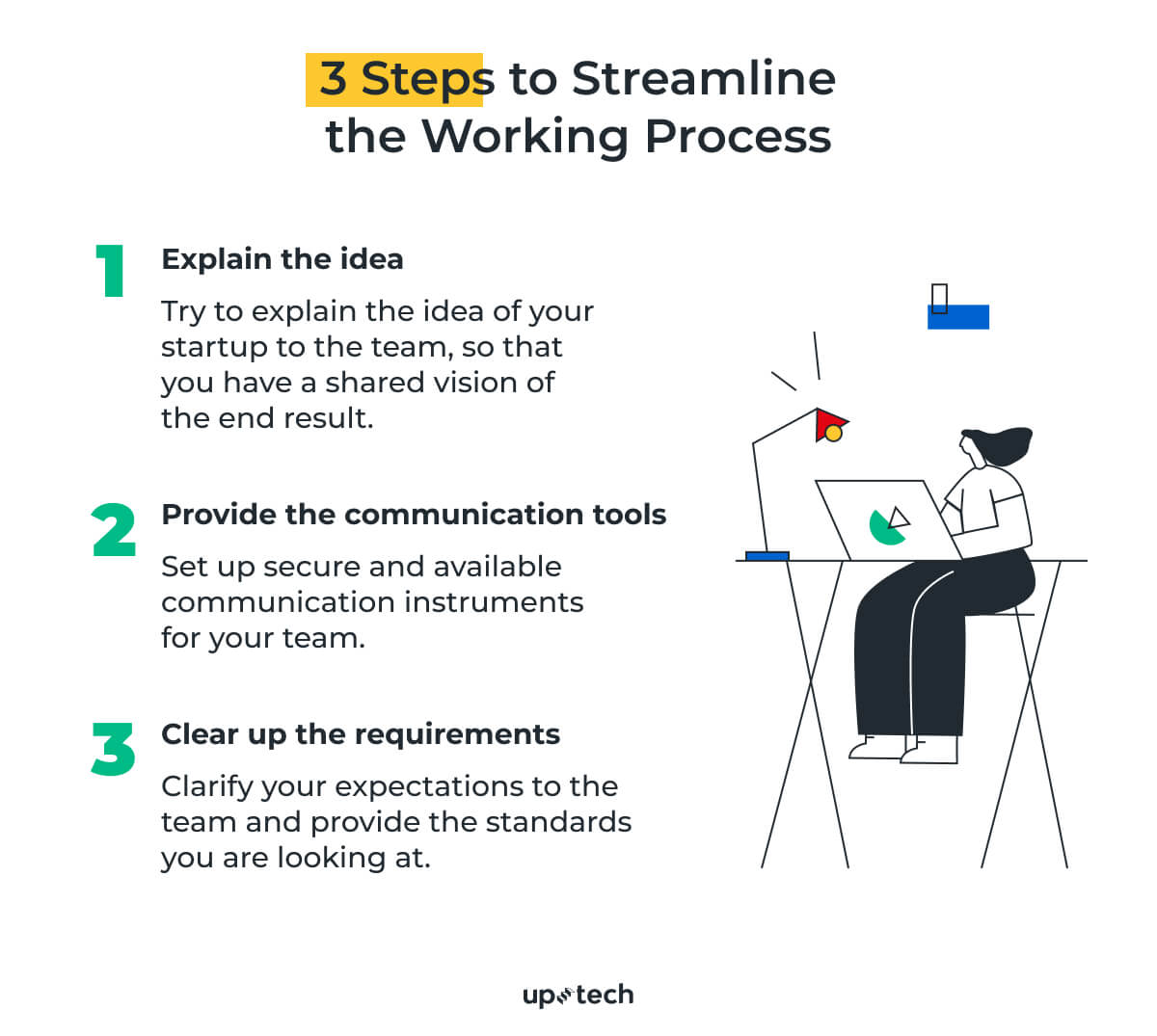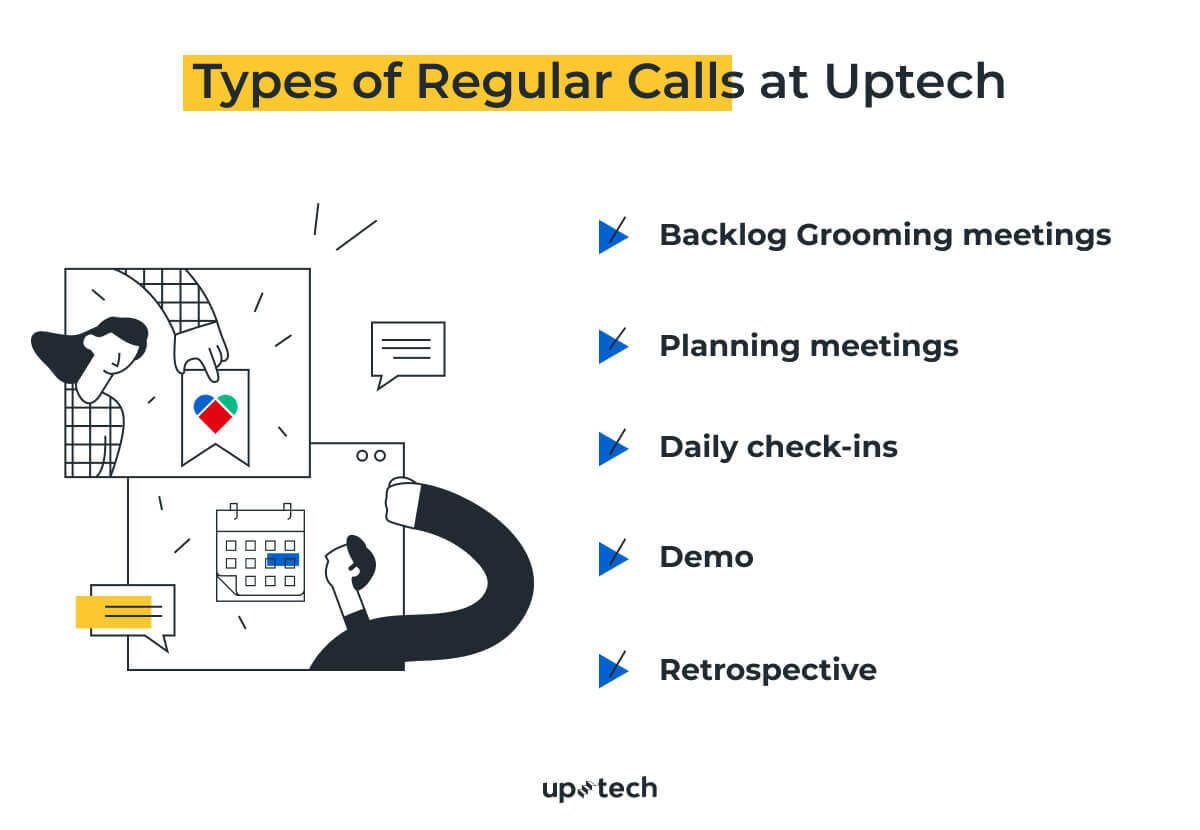Building a team is always challenging. And building a remote software development team is even scary. Indeed, there are many risks related to remote software team management: will such a team be motivated to work? How will they organize the development process? Am I not wasting money? What about the time zone? Well, and these questions are only to start with.
Besides these fears, tech giants like Alibaba, Skype, Basecamp, and Github go for outsourcing their web development part to remote software development teams. Well, it turns out making successful businesses outsourcing is a reality. It only takes some practical management skills to build a successful remote team.
In this article, I want to share some tricks of building remote software development teams that I acquired from working with foreign clients. You will learn:
- Which skills to look out for when hiring remote developers?
- How to organize the development process of the software development team?
- How to set up the communication in a remote team?
So let us dive right in.
Step 1 - Find a Proper Remote Software Development Team
As obvious as it seems, the secret to hiring a perfect software development team lies through the people. Indeed, as essential as mastering hard skills (like coding or testing), the candidates should also share your company's values.
The truth is, even though an outsource development team will not be employed, this team will be a part of your project. So while interviewing a potential software development team, pay attention to candidates’ soft skills, like ⬇️
Being team players
Developing products is not about only coding programs anymore. In fact, harmonized teams with integrated communication have more chances to produce a thriving product than a team of isolated developers. So try to check candidates’ ability to communicate, make common decisions, share experience and achieve goals together. Here are some hints on how you could check this out:
- Organize a call with the candidates and ask questions on the work process;
- Ask if the people you are considering for the vacancy have already worked together;
- Ask if the candidate(s) has experience of working in your targeted domain;
- Ask about the candidate’s favorite product/client, kinds of tasks they like to work at, and check what they value the most.
.png)
Balance between freedom and responsibility
Can you imagine that freedom and responsibility are not antecedents but rather are complementary sides of one coin? In fact, this is what Netflix’s miracle came from – “the no rules rule” dogma. A harmonious confluence of freedom and responsibility.
According to Reed Hastings, Netflix’s CEO, your company's core is not about strict corporate policies or hard work. Instead, people are the priority of the company and trust is at the core of corporate culture. This approach includes total (even stunning) transparency within the company, feedback loops, no official vacation and salary policies.
As weird as this no-control policy sounds, Netflix’s success speaks for itself: the company sits atop of the streaming services list, with 207.64 million paid subscribers worldwide as of the first quarter of 2021.
Following Netflix's pattern, at Uptech we also build a community of freedom and responsibility, where people are given freedom for free to organize their working schedules or determine their salaries but bear responsibility for their promises and expected input. The F&R value is one of Uptech’s values, covered by our manifesto.
Putting business needs first
Your software development team may consist of great professionals who are good at completing tasks and finding great solutions to the problems. But that will cut no ice, if these decisions do not bring any benefit to business.
I can’t stress it enough: every decision you make in your company should focus on the business needs. So make sure your remote software development team knows that.
Expert’s tip: Check if a candidate is business-oriented by observing the questions he/she asks during the interview. If these questions relate to your business goals, the candidate has more probability to be helpful to you. If not – try outlying your business objectives to the candidate and ask him how he/she could help.
For example, in my practice, the client insisted on including a feature to the website that had no relation to the business benefit. Considering business necessities, we convinced the client not to include this feature and called it a day.

Step 2 - Organize Working Procedures in Software Development Team
Another thing you can do to align the work of your software development team is to organize the working process. It takes strict working guidelines, deadlines, and defined documentations for your team to work productively. To complete this goal, you can undertake the following steps:
Unveil the idea of your project
The worst thing you can do for your software development team and your project is leaving an element of vagueness for them. For the best result, you need to present all the project details, explain where all your ideas come from, and make sure the software development team understands your goals. Moreover, with more information at hand, the development team will deliver the estimates for your project faster. Specifically, you can mention:
- Pre-history of your product and expectations from your partnership;
- Describe your business goals and aspirations, give the overall overview of where you want to get in the end;
- Tell about the domain where the end product will operate.
Provide your software development team with media for communication
It is crucial to pick comfortable communication and project management tools for your team, as simple as it seems. Thankfully, the list of such apps and devices is endless, and many of these instruments have gained traction during the pandemic lockdowns (Zoom, for example). Here is a short list of the tools that we use in communication:
- Slack – for everyday operations;
- Jira – for task management;
- Zoom and Google Meet – for video calls;
- Figma – for design development;
- Miro for real-time teamwork with a whiteboard.
Among our instruments there is also Plai – a performance management tool, specifically helpful for remote/distributed teams to align on a company's strategy and team's contribution.
Provide proper documentation
The project’s documentation is the ensemble of all the functional and non-functional specifications and constraints necessary for the developers to start working on the project. So make sure you have provided all the requirements on your project and thus strictly outline a shared vision and common values of the project.
Software documentation is an essential part of software development. But fear not, as you do not have to handle it by yourself. In fact, an initiative team of developers will help you with outlining requirements for your project individually.
To get a glimpse of how we collect software requirements at Uptech, please read our article on functional and non-functional requirements.

Step 3: Set Up the Communication
Hands down, the main thing in managing a remote software development team is quality communication. This is a simple truth that you will find in any article on the topic. And this text will not be an exclusion to this rule. Well-organized communication in a software development team, KPIs, and review process forms the bedrock of an effective team.
In his interview, Marc Zukerberg once mentioned that teamwork is about “ the social connections, it’s the culture, and it’s creativity.” The possible lack of communication is seen as the only downside of remote work.
Well, we can’t stress it enough: communication is the key. So here are some tips that could help you to set up the communication while working remotely:

Set up a calendar of meetings
Good communication means regular communication. Being systematic is very important for business as a whole or every part of it, be it the documentation routine, marketing, or outlet distribution.
The same concerns how you check in with your colleagues in a remote software development team: it is better to keep it organized rather than improvised. These could be meetings with a project manager, team lead, or a personal check-in with each team’s members. The key point is – they should be regular.
Another point here is regular meetings are not about controlling the development team. Instead, in trust-based relationships, you literally “check-in” on the team’s progress, help to remove the blockers and align the future plans.
Here are the types of regular meeting that help us stay synchronized at Uptech within Scrum methodology: infographic

- Backlog Grooming meetings. Here we discuss the remaining items in the backlog and plan what’s going to be completed during the upcoming sprint.
- Planning meetings. At these meetings, we put the existing tasks in the priority order and form precise tasks out of the backlog items.
- Daily check-ins. These meetings are necessary to keep personal contact with each team member via discussing the routine tasks and providing help if necessary.
- Demo. The sprint demo is a critical stage when the entire team presents a completed part of the client's work.
- Retrospective. During retrospective meetings, the team comes together in an informal setting to speculate on the sprint, figure out the main mistakes, highlight the improvements to make conclusions on what to do next.
Build personal connections
While keeping regular connections with the remote software development team team leads or managers, do not forget to build personal relationships with all team members. For this, you could organize informal online meetings and set up individual check-ins with each team member, for example, 1:1 s.
Tip: Daily/weekly 1:1 s should not be strictly about the business. Small talks are also a great way to build a healthy corporate structure within the company and keep personal contact with team members.
Another piece of advice is to be prepared for 1:1s, not to turn the meetings into time-wasters. It takes a schedule, deadline, topics for conversation, and a plan to make your meeting productive.
Define the Roles and Responsibilities in Your Remote Software Development Team
The composition of your remote software development team can be different, depending on your business needs. A typical software development team consists of such specialists as:
- Software Engineers – the people who will handle the frontend and backend parts of your software. How your product will function depends on the work of these people. So investing in sound engineers eventually pays off.
- QA engineer – a specialist who makes sure the software functions the way it is required in the documentation;
- Project Manager – the person who handles all the documentation, budgeting, and manages risks according to the project requirements;
- UX/UI Designers – not only will these specialists make your app/website vibrant and appealing, but also they will check on the app’s usability for the end-users.
Additionally, the software development team can also include:
- Product Owner – a person who translates the business needs into software requirements;
- Product Manager – a person who advises you on product development and drives the product development cycle. In that, they define the product’s value proposition, product-market fit, and product development roadmap. How are they different from a project manager? Read in our related article.
- Business Analyst – a specialist, charged with defining the product’s scope and gathering requirements for the project.
- Chief Architect – in case you have a complex project with multiple departments and teams, you will need an architect who will coordinate the workflow between these teams.

Closing words
Either remote or in-house, hiring a software development team is challenging. However, considering that these professionals are about to become a part of your product, it is easier to figure out what you need to seek in candidates. That said, it is essential to unveil all the details of your product to the software development team and provide smooth communication.
Working with Uptech product managers, you do not have to worry about these issues. Teamwork and business needs are our top values that we follow working with every new project.












































































.avif)























